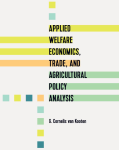Cornelis van Kooten G. (2021). Applied welfare economics, trade, and agricultural policy analysis. Toronto (Etats-Unis) : University of Toronto Press. 326 p.
| Titre : | Applied welfare economics, trade, and agricultural policy analysis |
| Auteurs : | G. Cornelis van Kooten |
| Type de document : | E-Book |
| Editeur : | Toronto [Etats-Unis] : University of Toronto Press, 2021 |
| ISBN/ISSN/EAN : | 978-1-4875-3323-6 |
| Format : | 326 p. |
| Langues : | Anglais |
| Langues du résumé : | Anglais |
| Catégories : |
Catégories principales 11 - COMMERCE ; 11.1 - Commerce (général ou théorique)Thésaurus IAMM COMMERCE AGRICOLE ; ECONOMIE AGRICOLE ; QUALITE DE LA VIE ; ECONOMIE DU BIEN ETRE ; POLITIQUE DE MARCHE ; POLITIQUE AGRICOLE ; ANALYSE COUT AVANTAGE ; BIEN NON MARCHAND ; EVALUATION DE PROJET ; COMMERCE INTERNATIONAL ; GOUVERNANCE ; GESTION DU RISQUE ; EXPLOITATION AGRICOLE ; CHANGEMENT CLIMATIQUE |
| Résumé : |
This textbook integrates three related fields in economics, namely agricultural/forestry economics, environmental economics, and international trade, by foregrounding cost-benefit analysis as a significant policy tool.
Exploring how welfare measures can be used in the analysis of agricultural, trade, and other economic policies, Applied Welfare Economics, Trade, and Agricultural Policy Analysis fills a gap in the literature on agricultural policy analysis by explaining the economic efficiency improvements and income transfers of various agricultural policy reforms in the United States, Canada, and the European Union. G. Cornelis van Kooten addresses methods of identifying and measuring economic surpluses (costs and benefits), the precautionary principle, identification of an appropriate discount rate, the importance of non-market values, and the role of agriculture in trade negotiations and climate change. Applied Welfare Economics, Trade, and Agricultural Policy Analysis draws on new research, brings attention to the existing literature, and includes review questions that challenge programming skills. The techniques developed in this text can be applied to the development and reform of agricultural policies in various regions in response to trade negotiations and many other situations involving government policy. |
| Note de contenu : |
Chapter 1. Introduction
Chapter 2. Project Evaluation Criteria Chapter 3. Externalities and Nonmarket Valuation Chapter 4. International Trade and Applied Welfare Analysis Chapter 5. Governance, Rent-Seeking, Global Trade and the Agreement on Agriculture Chapter 6. Analysis of Agricultural Policy: Theory Chapter 7. Agricultural Policies in the U.S. and Canada Chapter 8. Agricultural Policy in Europe and Asia Chapter 9. Agricultural Business Risk Management Chapter 10. Climate Change and Applied Welfare Economics |
| Cote : | Réservé lecteur CIHEAM |







